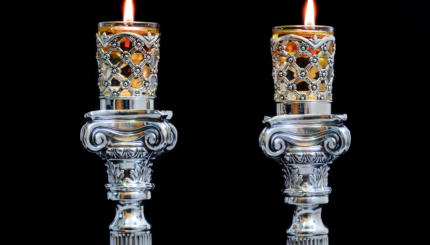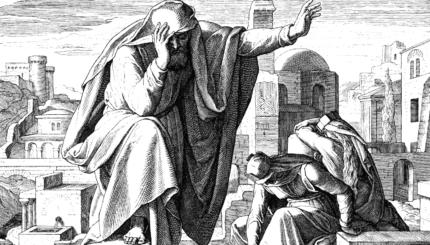Reprinted with permission from Hillel: The Foundation for Jewish Campus Life.
Now that Passover seders are over, and we are eating matzah and are full of affliction, one might ask, “What’s a good Jewish professional to do during these days?” The answer? Count them. Count every last day until Shavuot [the Festival of Weeks] — 50 in all.
The period of “the omer” begins the second night of Passover and continues until Shavuot. Literally translated, omer means “a sheaf.” It refers to the measure of grain that was once offered at the Temple in Jerusalem. The Torah commanded that seven weeks be counted for the omer. It says:
Leviticus 23:15-21
15. From the day on which you bring the sheaf of elevation offering the day after the Sabbath you shall count off seven weeks. They must be complete.
16. You must count until the day after the seventh week fifty days; then you shall bring an offering of new grain to YHWH.
17. You shall bring from your settlements two loaves of bread as an elevation offering…
21. On that same day you shall hold a celebration; it shall be a sacred occasion for you; you shall not work at your occupations. This is a law for all time in all your settlements, throughout the ages.
Torah Navigator
1. Why was it important to count the days from the bringing of the omer until Shavuot?
2. Shavuot in the Bible was not connected with the giving of the Torah on Mount Sinai, as it is now. It was an agricultural festival. And its focus was the Temple. Since the Temple no longer stands, and most of us are no longer involved in agriculture, what’s the point of counting the omer today?
While there is no longer a Temple or an omer offering, the rabbis declared that we should still count the days between Passover and Shavuot. Rambam [Maimonides] even said that the commandment for us to count today comes directly from Torah!
Kabbalists [mystics] saw the omer period as a preparation for receiving the Torah on Mount Sinai. Each day we must take one more step away from the impurities of Egypt that have remained within us. Today counting the omer can be a time of meditation where we can renew our spirits as we prepare for Shavuot. According to the mystics, each week of the seven is represented by a mystical aspect of the divine to focus on. And each day of the 49 is a combination of two aspects.
Associations with the Seven Sefirot of the Omer Period
[“Sefirot” refers to the kabbalistic notion of the divine emanations.]
1. Chesed: Overflowing Loving kindness
2. G’vurah: Judgment, Justice, Rigor
3. Tiferet: Compassion, Beauty, Balance
4. Netzakh: Victory, Efficiency, Prevailing
5. Hod: Glory, Splendor
6. Y’sod: Foundation, Intimacy, Generativity
7. Malkhut: Majesty, God’s Earthly Realm
How to Focus Each Day of the Omer
On the first day of the counting, work on chesed within chesed (the purest love within yourself). Day two: g’vurah within chesed (the anger within our love). And so forth.
On the second week, focus on g’vurah. Day Eight focus on chesed within g’vurah (the love inside judgement). And so on…
Thus goes the meditation.
A Word
The counting of the omer serves us as a link between Passover and Shavuot. It reminds us of the liberation we celebrated during Passover, and just how easy it is for us to slip back into slavery. Let each day of the 50 days bring us a moment of meditation, to work on our best selves and ready ourselves for receiving rules to live by (Torah) on Shavuot. May we learn how to make our lives easier, yet more meaningful as we celebrate in a small way each day, focusing on the important moments of life.
Happy counting!
chesed
Pronounced: KHEH-sed, Origin: Hebrew, lovingkindness, compassion.
Shavuot
Pronounced: shah-voo-OTE (oo as in boot), also shah-VOO-us, Origin: Hebrew, the holiday celebrating the giving of the Torah at Mount Sinai, falls in the Hebrew month Sivan, which usually coincides with May or June.
Torah
Pronunced: TORE-uh, Origin: Hebrew, the Five Books of Moses.


